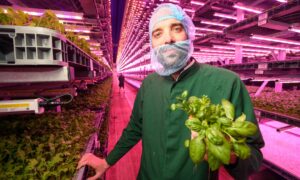
Fifteen layers of trays, brimming with lettuces, salad leaves, basil and other herbs are growing underneath rows of multicoloured LED lights, stacked one above the other. The wall of edible greenery rises 10 metres high, all the way to the roof of a vast building in Lydney near Gloucester.
This vast matrix of glowing shelves is one of Britain’s latest vertical farms, growing plants indoors in a tightly controlled environment all year round. With the jump in energy prices and other costs, a string of similar ventures have gone out of business in recent years but the technology is still hailed by some as the future of food.
Operated by Jones Food Company (JFC), Lydney has moved firmly past the pilot phase to become a significant supermarket supplier. It supplies 30% of the UK’s cut basil, and can produce 550 tonnes of fresh greens a year.
Lettuces, pak choi, mizuna, komatsuna (known as Japanese spinach), watercress, basil, coriander, parsley and dill are grown at three times the speed of traditional horizontal agriculture. Salad crops take only 10 days – without pesticides, and requiring 94% less water. They are seeded on to a substrate of sheep’s wool and recycled plastic bottles using a method called hydroponics – growing plants without soil by feeding them mineral nutrient salts dissolved in water.
The site requires a lot of electricity to power the lights, heaters, humidifiers and other equipment but at the Lydney farm this is generated from renewable sources such as wind and solar, says the chief executive, James Lloyd-Jones, who set up JFC in 2017.
The business is backed by Ocado, with the online grocer selling its fresh salad leaves and herbs. Another customer is Asda, which sells an 80g homegrown mixed salad bag for £1. Meanwhile, the rival firm GrowUp Farms supplies its Unbeleafable salad range to Tesco to retail at £1.50 for a 90g bag, and its Fresh Leaf Co brand for £1 for a 70g bag in Iceland supermarkets, and has just launched in Spar stores.
Other ventures have fared less well. Among those that have gone out of business are the startup Agricool in suburban Paris in 2022, and last year, the Florida firm Kalera and the Kentucky-based AppHarvest, whose valuations had risen to more than $100m (£79m).
The biggest global player, New Jersey-based AeroFarms, backed by the Duke of Westminster’s property firm Grosvenor and Abu Dhabi Investment Office, had planned to go public with a $1.2bn valuation three years ago. It used a Chapter 11 bankruptcy filing to restructure its business in September. Germany’s Infarm shut its European operations, including its flagship farm in Bedford, to focus on “high-potential regions better suited for indoor farming, with low energy prices” such as the Middle East. And Growing Underground, which wanted to feed London greens grown in a former second world war air-raid shelter below Clapham High Street in south London, was dissolved in November.
